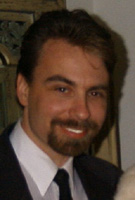
|
|
This talk is a follow-up to the talk Tom Brod and I shared last year entitled "What's Happening When Nothing's Happening?" If I'm able to gather enough data of this new metric from a new ADD study we've recently begun, you'll hear it here first. It will explain why we don't see people consistently declining in functioning when we reward for increases in alpha and theta. Or why can P300s or fMRIs show consistent increases and decreases functionality with beta-SMR training without changes in amplitudes in those bands. One thing we know for sure is that the brain isn't amplitude modulated or we would make more noise going under power lines than our old AM radios. Or was it really the radio buzzing when we drove under them? I'm kidding {poke}.
Perhaps including this metric in the feedback process is part of the increased progress I've been having in the last year. It also could lead to new discoveries in other symptomatology.
Bill Scott is a co-investigator of a research project studying somatization disorders at UCLA’s Neuropsychiatric Institute with Lobsang Rapgay, Ph.D. He’s in the design process of a study investigating brain states during mindfulness meditation with Jeffery Schwartz, M.D. and Barry Sterman, Ph.D. He recently developed a new neuroimaging technology that creates a fractal signature from EEG and is successfully utilizing this technology as a form of EEG biofeedback in a process termed BrainPaint®. He is the first author and principal investigator of a controlled study on addictions (n=121) which was published in August 2005 in The American Journal of Drug and Alcohol Abuse, with David Kaiser, Ph.D, Siegfried Othmer, Ph.D, and Steven Sideroff, Ph.D. Bill was also the principal investigator and first author of an addiction research project that yielded a 79% success rate with Native American alcoholics. This study was with Dr. Eugene Penniston (in press). An interview with Bill by the Psychiatric Times was published as a feature article. Bill and David Kaiser presented research at the American Association for the Advancement of Science with Dr. David Kaiser. He trained the researchers Dr. John Gruzelier and Dr. Tobias Egner (members of Department of Cognitive Neuroscience and Behaviour, Imperial College Medical School) in the use of alpha-theta protocols. The results of this research project so improved music abilities among Royal Conservatoire of Music students that the Conservatoire adopted these protocols into the school’s curriculum. Bill has been published in the January 2000 issue of Clinical Electroencephalography (EEG), an official journal of the EEG and Clinical Neuroscience Society (ECNS). He contributed a chapter on alpha-theta EEG biofeedback in Jim Robbins' Book, "A Symphony in the Brain." He has presented his research and has taught workshops with Tom Brod, M.D. on anxiety disorders at three American Psychiatric Associations annual conventions. In association with Michael Hoffman, Bill is also currently involved with the Narcotics Division of the American Embassy in South America where they are teaching their protocols to other researchers in order to quickly replicate their work in Latin America. He participated in the 4th annual Meeting of Experts on Demand Reduction for the Organization of American States. Bill has been training EEG biofeedback practitioners since 1996 and has taught over two thousand of them at this time. He’s most passionate about evaluating and demonstrating EEG biofeedback’s effectiveness through research, refining assessment, improving protocol selection, measuring outcomes and discovering innovative ways to transfer his knowledge to practitioners and research teams. He’s been in private practice since 2000 in West Los Angeles and Malibu. Other Products by Bill Scott 1) Effects of an EEG Biofeedback Protocol on a Mixed Substance Abusing Population
To View Comments or Join the Conversation: |
Most Viewed of all Products
Trauma and Recovery: The Integration of Neurofeedback and Psychotherapy
|

